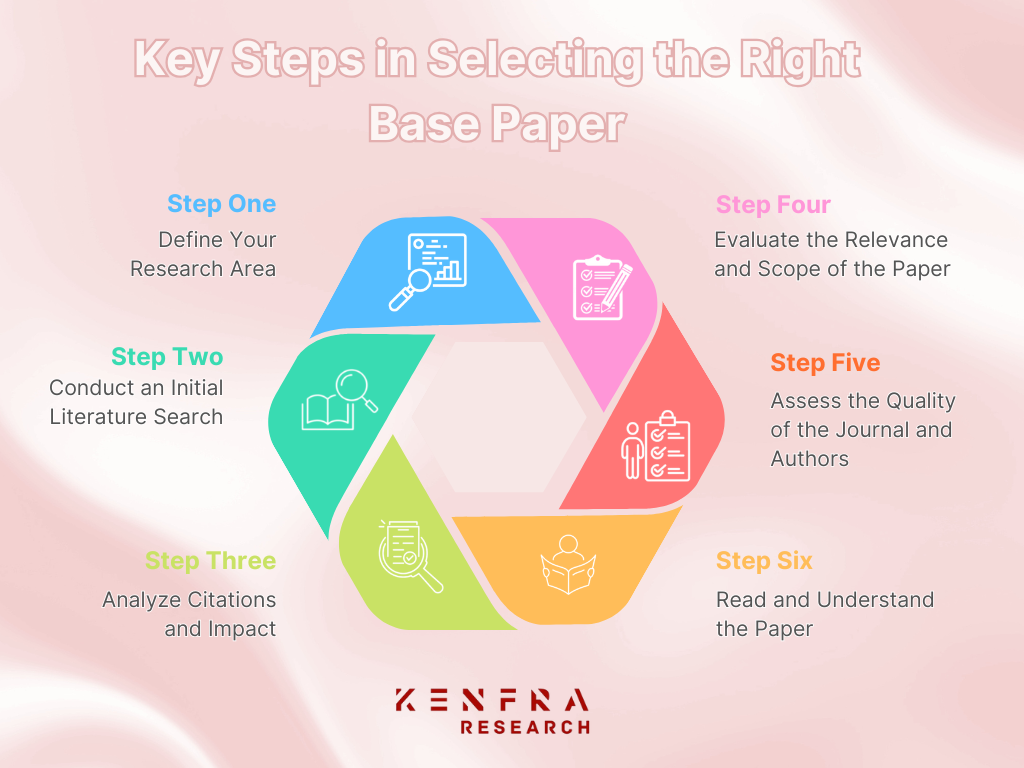06Nov

Selecting the right base paper for your research is one of the foundational steps in conducting impactful research. The base paper serves as a reliable reference point, offering insights into your chosen area of study and helping you understand existing solutions, methodologies, and research gaps. This blog will guide you through selecting the right base paper for your research work.
A base paper is a key academic article that provides a comprehensive overview of a specific research area, theory, or methodology. It is often chosen for its relevance, credibility, and contribution to the field. The base paper helps in setting the direction for your research and provides a benchmark against which you can compare and build upon existing findings.
Selecting the right base paper is crucial for several reasons:

Before you start searching for a base paper, clarify your research area. This involves identifying the specific topic you want to study, as well as any keywords, methodologies, or subfields related to your work. Having a well-defined research area will help narrow down your search to papers that are most relevant to your topic.
Use academic databases like Google Scholar, IEEE Xplore, PubMed, or Scopus to conduct a literature search using your keywords. Start with broad keywords and gradually refine your search based on the results. Look for high-impact papers that appear frequently and are published in reputable journals within the last 3-5 years, as they are likely to be more relevant to current trends.
Citation counts can be an indicator of a paper’s influence. Papers with high citation counts have generally made significant contributions to their field. While a high citation count doesn’t necessarily mean the paper is perfect, it’s often a sign that the research is well-regarded and widely used as a reference.
A strong base paper should align closely with your research questions and objectives. Consider the following when evaluating relevance:
A good base paper doesn’t necessarily need to answer your research question directly; it may focus on the theoretical or methodological aspects that align with your study.
A base paper from a high-quality, peer-reviewed journal adds weight to your research. Look for papers published in reputable journals associated with organizations like IEEE, Elsevier, and Springer. Additionally, evaluate the credentials of the authors—those with expertise and a strong publication record in the field lend additional credibility to the work.
Once you have shortlisted potential base papers, read them thoroughly to understand their content, findings, and limitations. Take note of the following:
Choosing the right base paper for your research is a strategic decision that can significantly influence the success of your research. By carefully defining your research area, evaluating the relevance and quality of papers, and using reliable databases, you can find a strong base paper that will set the foundation for a robust study. Following these guidelines will help you select a paper that provides valuable insights, guides your literature review, and ultimately strengthens your research contribution.
Kenfra Research provides base paper selection services to help you lay a strong foundation for your PhD research. Our experts assist you in identifying the right base paper for your research, along with seminal papers and key studies in your field, ensuring a solid basis for your own work.

In the journey of academic discovery, Understanding Research Ethics and Consent Forms is not just a requirement—it’s a foundation. These... read more
Assistant profs with PhD from private univ under govt lens Accreditation and Quality of Education:Scrutiny of Assistant Professors with PhDs from... read more
More students opt for science, engg streams in SPPU colleges Savitribai Phule Pune University, formerly known as the University of Pune.... read more
Transitioning from mathematics to physics for a high-paying PhD program can be a rewarding academic and career move. Here are... read more

Writing a PhD thesis can feel like navigating a labyrinth. From formulating a research question to handing in a... read more

Framing research objectives and questions is the most crucial step in setting a strong foundation for any academic project, whether... read more

Embarking on a PhD journey is both exciting and challenging. For first-year PhD students and those preparing... read more

Writing a PhD thesis is one of the most intellectually demanding tasks in academia. It's not just about conducting... read more
SPPU (Savitribai Phule Pune University) had not released any new guidelines for PhD entrance. However, universities often revise their guidelines... read more
WhatsApp us
Leave a Reply